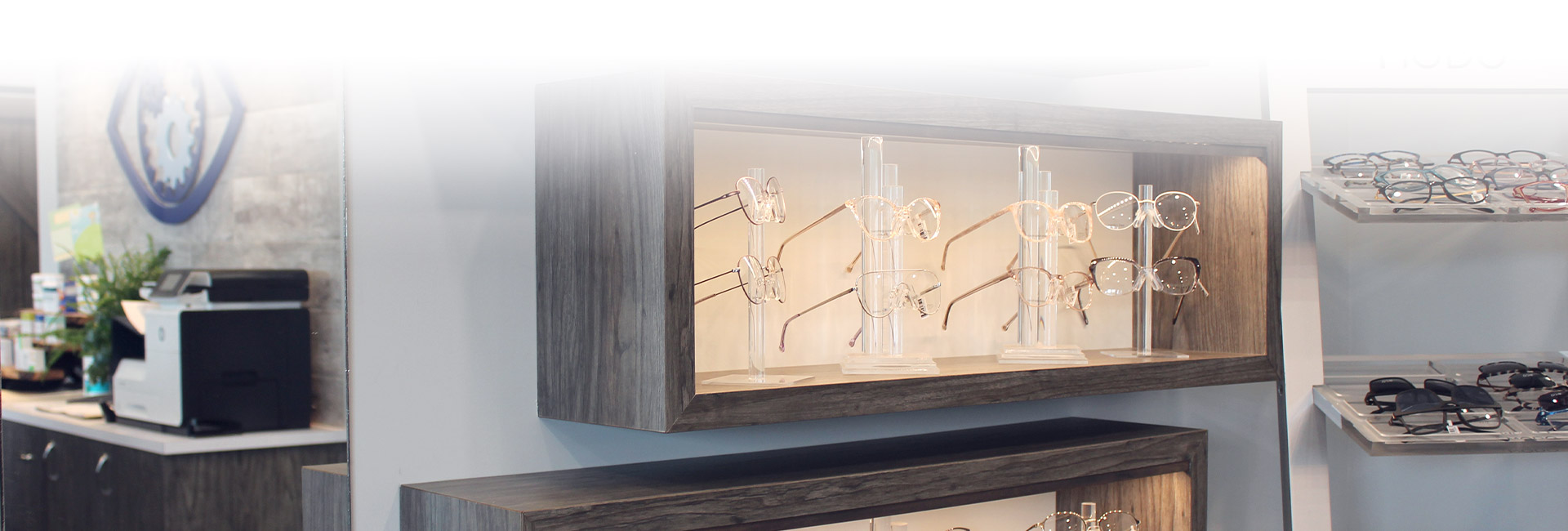When you have a refractive error that seems to increase with every visit to your optometrist, you may wonder how you can protect your vision in the long term.
There are ways you can preserve your vision as an adult, but it is especially helpful to protect children’s sight while they are young so they can see well into the future.
Slowing Down Worsening Vision in Kids
If your child has blurry vision, it’s called a refractive error. The most common refractive error for children to develop is myopia (also called nearsightedness). Myopia is characterized by blurry distance vision, while close-up objects appear clearer.
Thanks to modern optometry, we now know that we can control the progression of myopia, helping to slow down eyesight deterioration from a young age.
Although myopia isn’t reversible, there are methods available to help keep your child’s vision as clear as possible. Without intervention, their vision may continue to worsen into adulthood—and high refractive errors come with the added risk of developing eye conditions and vision loss later in life.
How Can Myopia be Controlled?
The sooner myopia is diagnosed, the sooner an optometrist can begin controlling its progression. Management techniques are more effective the younger they begin.
Preventing myopia from developing into high myopia can help protect your child’s sight.
Ways we may help control the progression of this refractive error can include:
- Specialty Prescription glasses to help reduce eye strain and focus the image they see (MiYOSMART and MyoVision lenses)
- Specialty Contact lenses with different focusing areas to correct vision and slow progression (MiSight contact lenses)
- Contact lenses that help reshape the outermost surface of their eye (Orthokeratology)
- Prescription eye drops called atropine can reduce how quickly the eye elongates during development
Beyond 20/20 has seen success in controlling myopia in children using:
- MiSight 1 day contact lenses
- MyoVision Pro lenses
- MiYOSMART lenses

Maintaining a Healthy Lifestyle at All Ages
It is important to maintain a healthy lifestyle to promote our well-being throughout all of life’s stages. Keeping active and eating well can have a positive impact on your eye health and your overall health.
Visiting your eye doctor regularly is just as important as seeing your general practitioner. When you receive routine eye exams, your optometrist can establish a baseline for your normal vision. If anything changes, they can take proactive steps to preserve your sight.
Eating Well
Healthy foods, like dark, leafy greens and fish, are extremely beneficial to your eye health!
Following a nutritious meal plan can help protect your eyes from:
- Cataracts
- Age-related macular degeneration
- Glaucoma
- Dry eyes
- Impaired night vision
Foods you can work into your diet include:
- Fish—contains Omega 3 fatty acids that promote healthy retinas (especially salmon)
- Eggs—contain vitamin A, lutein, zeaxanthin, and zinc, contributing to the health of the retina, cornea, and preventing age-related eye diseases
- Almonds—contain vitamin E, which safeguards tissue and prevents age-related eye issues
- Dairy—contains vitamin A and zinc, which work together to protect the cornea
- Carrots—contain vitamin A and beta carotene, protecting the cornea and preventing eye infections
- Kale—contains antioxidants to protect your eyes from age-related eye diseases and issues
- Oranges—contain vitamin C, which is essential for healthy blood vessels in your eyes
If you’re unable to work all of these ingredients into your diet, talk to your optometrist about healthy supplements you can take to help keep your eyes healthy.
Staying Active
Being physically active has so many health benefits, including some that help protect your eyes. Maintaining a healthy, active lifestyle can lower your risk of developing long-term health conditions like diabetes, high blood pressure, and high cholesterol.
Health conditions like these can have an impact on your eye health, damaging blood vessels in your eyes, which could lead to conditions like diabetic retinopathy and macular edema if left untreated.
If you have a health condition like diabetes, it is important to follow your optometrist’s recommended eye exam schedule.
Protecting Your Eyes from the Sun
The ultraviolet light from the sun can cause cumulative and irreversible damage to your eyes. From the warmest summer days to the coldest months of the year, the sun is emitting harmful UV rays.
You can protect your eye health and vision from sun damage by wearing a good pair of sunglasses with 100% UVA and UVB protection. When you’re buying glasses, check them to make sure they will protect your eyes, and not just a shaded view.
All Beyond 20/20’s sunglasses are rated for UVA and UVB protection. All clear Zeiss lenses are rated for UVA and UVB protection, including Zeiss kids lenses.
Making Healthy Choices
There’s no denying that smoking tobacco is bad for your health—and that includes your eyes. Smoking can cause your eyes to dry out quicker, resulting in problems with your cornea and making contact lens wear difficult.
It can also increase your risk and worsen developing eye issues and diseases like cataracts and macular degeneration. Ask your doctor about smoke cessation today.
Preventing Eye Issues from Worsening
Knowing the signs and symptoms of eye disease can help protect your vision, but not all eye diseases show signs and symptoms in their earliest stages.
That’s why it is important to attend your routine eye exams. Identifying risk factors, early warning signs, and diagnosing issues early are your best defence against deteriorating vision.
Your optometrist can perform tests to monitor your eyes for signs of eye diseases that you might not otherwise notice. From there, they can work with you to build a proactive treatment plan to help preserve your vision.Let Beyond 20/20 help you maintain your vision and slow down eyesight deterioration by scheduling your next eye exam with our trusted team.




